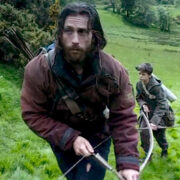DAVID STRATTON – A CINEMATIC LIFE: A Loving But Eclectic Retrospective

Alex is a 28 year-old West Australian who has a…
In an era where absolutely anybody can be a movie critic, the age of the go-to movie critic is slowly dying. Before the internet, when information wasn’t as easily shared or accessible to all, movie critics had an essential role in the movie industry, helping inform people of the current cinematic landscape, highlighting films and people that readers may not have been aware of before.
The rise of prominent film journalists such as Roger Ebert, Pauline Kael and Danny Peary stressed the importance of film correspondence within society, analyzing cinema on a deeper level that allowed readers to view films in a more critical and interpretative manner, allowing them to dissect why we think a film is ‘good’ or ‘bad’. Now that there’s an excess of critics, online and in print, it has diluted the importance of the singular critic voice, especially with services such as IMDB, Rotten Tomatoes and MetaCritic, that essentially boil all reviews down to a simple percentage, meaning that the typical reader doesn’t even have to read a review anymore, as long as it can be boiled down to positive or negative.
With Ebert and Kael now passed away, not many critics have replaced their prominence in film culture, with the closest figures being UK’s Mark Kermode, veteran American critic Leonard Maltin and a diverse bunch of YouTube critics, who aim to keep film discussion alive with an array of video essays and filmed conversations. In terms of Australian film criticism, not many have crossed into international recognition, with the most well known being veteran film critic David Stratton.
Stratton is celebrated due to his television series, At the Movies (co-hosted with Margaret Pomeranz), a Siskel & Ebert like show from 2004 where Margaret and David reviewed the past week of films, a famous program that ran for just over 10 years and became a vital part of Australian film culture. Now at the age of 77 and having watched over 25,000 different films (minus any rewatches), Stratton is the subject of the documentary David Stratton: A Cinematic Life, Sally Aitken’s sincere portrait of the highly opinionated but passionate man.
Looking Back on Life
Starting with his childhood back at England in 1946, Stratton’s fascination with watching films and documenting his experiences started with the British film The Overlanders. Spending all his free time watching everything that hit the cinema, the film documents Stratton’s journey from England to Australia, where a job at the Sydney Film Festival started his journey towards Australia’s most prominent film critic. To avoid the tropes of a typical biopic, which would involve moments of Stratton’s life interspersed with praise and stories from people from his life, the documentary decides to link Stratton’s life story with that of the history of Australian cinema.
Stratton’s harsh adjustment to Australian life leads to a comparison to Ted Kotcheff’s masterpiece Wake in Fright, which then diverts into a quick discussion and remembrance of the film. Whilst it’s pleasing to see a documentary that isn’t just blind praise and a visual translation of Stratton’s Wikipedia page, trying to coincide it with the different sides of Australian cinema is the film’s biggest strength and weakness.

Even though some people may question the current state of the Australian film industry (despite our past two years of Oscar success), you cannot deny that Australia has quite a diverse and interesting cinematic history. With a mix of social realist dramas, exploitation cinema and experimental arthouse, Australia has plenty of content to justify several documentaries on all the different types of films that have been produced in the past 100 years, with Mark Hartley’s documentary Not Quite Hollywood, which focuses on Australia’s exploitation period in the 70’s/80’s, a great example of such.
With A Cinematic Life, director Aitken has attempted to blend a diverse look at the different layers of Australia’s cinematic history, linking it to moments in Stratton’s life. The problem is, these links lead into segments that feel quite divergent and completely separate to the central story of Stratton’s life. Whenever a new film is introduced (titles include The Castle, Head-On and Muriel’s Wedding), the documentary shifts into a 10 minute segment about that particular movie, with a brief look at its behind the scenes process and cultural impact. Whilst these are nice segments on their own, they start to feel distracting after a while and essentially feel like padding.
And Now For Something Completely Different…
These pieces start to feel like interruptions because Stratton’s life stories and retellings of his various experiences are genuinely interesting and present the film critic in a new light. There’s quite a few stories and elements of Stratton‘s life that I was never aware of before seeing this documentary and I found most of them quite surprising and provided plenty of engaging material, as the information frequently shifted from tragic, to joy and to sadness, but never feeling forced or inorganic.
I don’t want to spoil them, as the different untold stories and historical beats of Stratton’s life give the film its most interesting scenes, as we see David go from an usher at a film festival to the president of it, then working for Variety for a decade and ultimately hosting his extremely popular television series. Despite the film trying to avoid the structure of a stereotypical biopic, A Cinematic Life is at its most successful when it is fulfilling the composition of a typical artistic biography (although luckily the film avoids any montages of blind praise towards its subject matter), thanks to Stratton’s rich history and large amount of celebrity talking heads that frequently makes sure the interview portions never get monotonous.

When the film starts to divulge into another segment of Australian cinema, the emotional connection formed stops and it becomes a very rushed and fleeting look at another Australian movie. These periodic stoppages make the documentary’s overall momentum feel cut short repeatedly, giving the film a stop and start nature that starts to get old after the first hour. Upon learning that the film is a condensed version of a 3 part miniseries that is to be aired at a later date, its uneven pace starts to make sense.
If the structure of the film had felt a lot more linear, say if you tracked the erratic shifts in Australian cinema alongside the timeline of Stratton’s life, the comparisons would’ve felt more natural, but due to their sporadic arrivals and non-linear delivery, in the middle of authentic and charming moments with Stratton and other talking heads, it gives the film an erratic tone that gives off the obvious signs that it is a heavily edited version of a longer and more detailed project.
Examining The Details
Another problem that these history segments cause is that they heavily overtake the running time of the documentary (which is just under 100 minutes). Due to the focus on these parts, many details about David Stratton’s life are left out. Huge chunks of Stratton‘s life are glossed over, most notably his 10 year time of doing At the Movies with Margaret Pomeranz. Any details about the creation and end of the show are completely ignored and overall it is only referenced for a couple of minutes, a surprisingly minuscule look at something that is a large part of his place in pop culture. Once again, I can only speculate that this is explored further in the upcoming miniseries, but I’d rather learn about these details about Stratton’s life than say, a look at the 1955 film Jedda.

Another missed opportunity is to analyze the juxtaposition in the changes in Stratton’s character over his lengthy 50 year plus career, particularly where it showed Stratton being the front-runner in anti-censorship movement for Australian films in the early 1980’s compared to his comments about Geoffrey Wright’s highly controversial 1992 neo-nazi film Romper Stomper, where Stratton allegedly commented that the negatives of the film “should be burnt” (a comment that Stratton denies in the documentary). Even if his statement was misheard/misinterpreted, Stratton refused to reward the film a score at all in an attempt to get people to not watch the movie (which ironically caused the opposite effect). The different viewpoints in censorship in Stratton’s history would be an intriguing angle to explore, but the film fails to capitalize on that chance.
Conclusion
Despite these elements, David Stratton: A Cinematic Life is a genuinely sympathetic and warmhearted look at one of Australia’s most prominent media figures. Whilst frequently disruptive and seemingly erratic in nature, the diverse look at Australia’s cinematic history and its relation to Stratton’s absorbing background provides plenty of material for cinephiles and mainstream audiences alike, either reminding people of films they love or giving teases to some gems in Australia’s history that they should finally catch up on.
Some might want to wait for the upcoming miniseries, which promises to expand on these jarring elements, providing a larger canvas to detail Stratton‘s life alongside the multiple sides of Australia’s affluent movie background. Whilst some may compare it to Roger Ebert’s biography Life Itself, Sally Aitken’s documentary steps out of its shadow by providing an erratic, but authentically fond look at Australia’s most popular film critic.
What do you think about the current state of film criticism?
David Stratton: A Cinematic Life is released in Australian cinemas on March 9th.
Does content like this matter to you?
Become a Member and support film journalism. Unlock access to all of Film Inquiry`s great articles. Join a community of like-minded readers who are passionate about cinema - get access to our private members Network, give back to independent filmmakers, and more.












